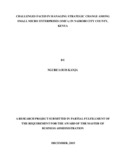| dc.description.abstract | The main objective of this study was to discover which strategies SMEs in Nairobi use so to overcome the challenges of global turbulence with specific objectives being: To determine the challenges faced in managing strategic change within SMEs in Nairobi County and then establish which strategic change management practices are adopted by the SME‟s to overcome said challenges. The study adopted a descriptive research design and the use of questionnaires as a method of data collection since the study is descriptive in nature. The researcher chose a target of 2245 SME entrepreneurs in Nairobi CBD. The researcher used the simple stratified random sampling technique, and delivered 300 questionnaires aiming to attain 225 complete responses which would represent 10 percent of the target population under study. Due to issues of non-responses and other field research challenges; in terms of, unwillingness to disclose private company material made it difficult. Therefore the research had to deliver additional questionnaires in order to achieve the same goals: Thus, having to increase the 225 questionnaires to 300 to ensure a threshold of as close to 225 (10%) as possible of target population of 2245. However, the study finally obtained at least 177 respondents. The data collection method which was used in this study included primary data which was collected using questionnaires. Data analysis was carried out separately for a quantitative (primary research) and qualitative assessment (secondary research) to understand the relationship between the given variables. The study employed the use of SPSS software to analyse data, where it was found that, lack of skilled management, poor leadership and lack of strategic planning are the major challenges facing SMEs in adopting strategic change management. The research recommends that SME leaders and managers should invest in training and development of their staff in strategic management practices, so that they are better prepared to handle the 21st century of global complexity and environmental turbulence. For instance, the European Union enacted legislation to the support, fund and develop its SME‟s (EU, 2005), in the enlarged European Union of 25 countries, some 23 million SMEs provide around 75 million jobs and represent 99% of all enterprises; clearly proving the importance and significance of the SME sector in the world economy.More specifically, The Kenyan government policies should support the growth and development of SMEs by enacting legislation conducive to the needs of these companies to ensure they are just as successful as the ones in developed countries. | en_US |



